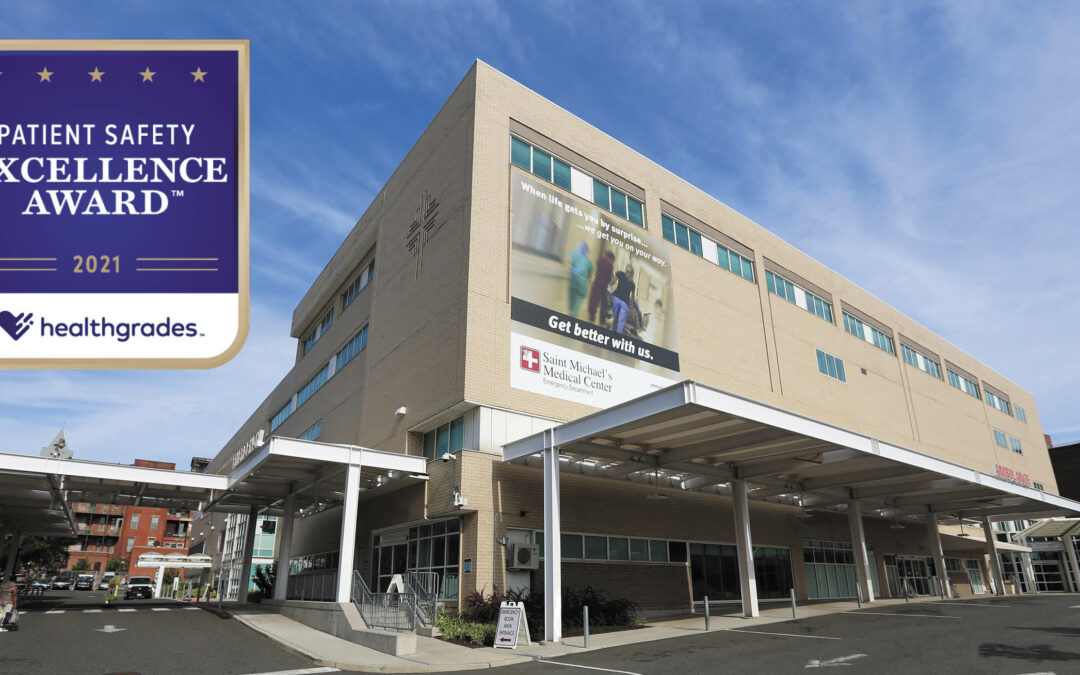NEWARK, NJ – Saint Michael’s Medical Center, a member of Prime Healthcare, announced today that it has been recognized as a Healthgrades Patient Safety Excellence Award recipient for the third year in a row.
Saint Michael’s is the only hospital in Newark and Essex County and one of only seven in the state to be recognized by Healthgrades for the last three years in a row. Saint Michael’s is a member of Prime Healthcare, which had two of its other New Jersey hospitals — Saint Clare’s Denville Hospital and Saint Clare’s Dover Hospital — recognized by Healthgrades for the last three years.
This distinction places Saint Michael’s among the top 5% of all short-term acute care hospitals reporting patient safety data as evaluated by Healthgrades, the leading marketplace connecting patients and providers.
Prime Healthcare has more Patient Safety recipient hospitals than any health system nationwide for six years in a row (2016-2021).
From 2017 through 2019, there were 190,273 potentially preventable patient safety events among Medicare patients in U.S. hospitals.* And, if all hospitals, as a group, performed similarly to hospitals performing better than expected on each of 13 Patient Safety Indicators (PSIs) evaluated by Healthgrades, on average, 106,052 patient safety events could have been avoided.*
“The importance of hospital quality is now at the forefront of consumer’s minds, especially as we continue to navigate COVID-19. We congratulate the recipients of the Healthgrades 2021 Patient Safety Excellence Award for their ongoing commitment to upholding the highest quality standards for their patients and communities,” said Brad Bowman, MD, Chief Medical Officer, Healthgrades.
During this time frame, four patient safety indicators accounted for 72% of all patient safety events (collapsed lung, hip fracture due to an in-hospital fall, pressure or bed sores and catheter-related bloodstream infections). Healthgrades found that patients treated in hospitals receiving the Healthgrades 2021 Patient Safety Excellence Award were, on average*:
• 50.3% less likely to experience a collapsed lung due to a procedure or surgery in or around the chest, than patients treated at non-recipient hospitals.*
• 60.3% less likely to experience an in-hospital fall resulting in hip fracture, than patients treated at non-recipient hospitals.*
• 66.5% less likely to experience pressure sores or bed sores acquired in the hospital, than patients treated at non-recipient hospitals.*
• 65.4% less likely to experience catheter-related bloodstream infections acquired in the hospital, than patients treated at non- recipient hospitals.*
“Since Saint Michael’s was purchased by Prime Healthcare five years ago this month, the hospital has made a concerted effort to invest in clinical quality and patient care,” said Saint Michael’s CEO Alan Sickles, MD. “Patient safety has always been paramount at Saint Michael’s and the coronavirus pandemic has only heightened the importance of providng a safe environment for those who choose our hospital. This award is only possible because of the contributions of each and every one of our staff members.”
During the study period (2017 through 2019), Healthgrades 2021 Patient Safety Excellence Award recipient hospitals demonstrated excellent performance in patient safety within the Medicare population, as measured by objective outcomes—risk-adjusted patient safety indicator (PSI) rates—for 13 PSIs defined by the Agency for Healthcare Research and Quality (AHRQ). A 14th PSI is included in the evaluation – Foreign Objects Left in Body During a Surgery or Procedure – which is a “never” event and does not have an expected rate.
View Healthgrades hospital quality methodologies.
*Statistics are calculated from Healthgrades Patient Safety Ratings and Excellence Award methodology which is based primarily on AHRQ technical specifications (Version 2020.0.1) to MedPAR data for years 2017 through 2019 and represent three-year estimates for Medicare patients only.


